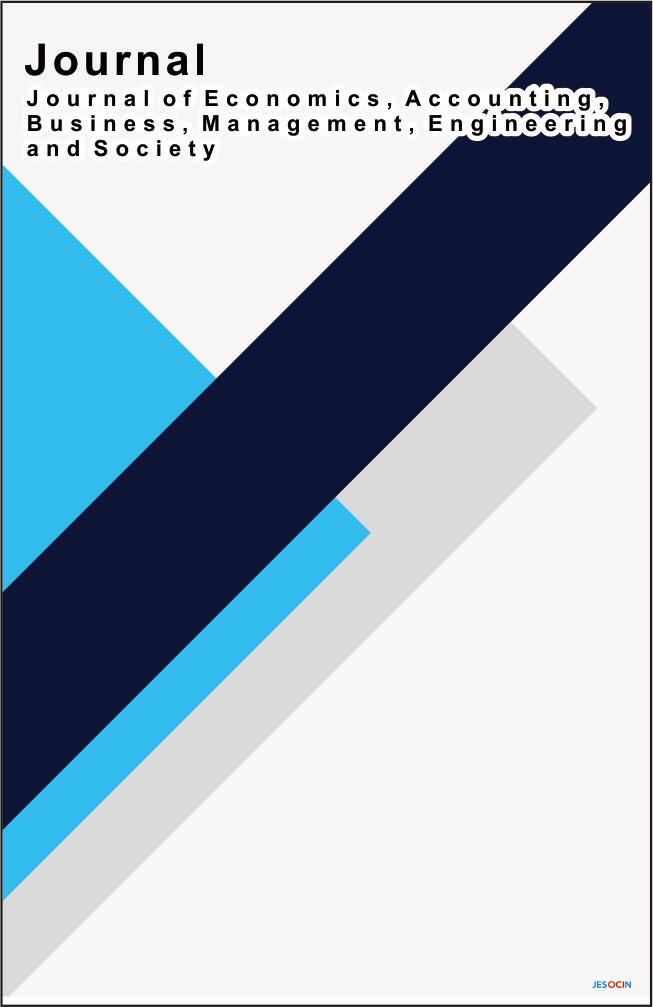articel EVALUATING THE IMPACT OF SUSTAINABILITY REPORTING ON CORPORATE FINANCIAL PERFORMANCE
Keywords:
Sustainability Reporting, Corporate Financial Performance, Environmental, Social, Governance (ESG), Return on Assets (ROA)Abstract
Background:
Sustainability reporting has become an essential aspect of corporate governance, driven by the increasing demand for transparency in environmental, social, and governance (ESG) practices. As companies face growing pressure from investors, regulators, and consumers to adopt sustainable practices, the need to understand the impact of sustainability reporting on corporate financial performance has never been more critical.
Aims:
This study aims to evaluate the relationship between sustainability reporting and corporate financial performance, focusing on the role of environmental, social, and governance factors in influencing financial outcomes. By examining data from publicly listed companies across various industries, this research seeks to identify the key drivers of financial success linked to sustainability practices.
Research Method:
A mixed-methods approach was employed, combining quantitative analysis of financial data from 50 publicly listed companies spanning from 2015 to 2023, with qualitative insights gathered through semi-structured interviews with industry experts. Key financial metrics such as return on assets (ROA), return on equity (ROE), and earnings per share (EPS) were analyzed in relation to ESG scores derived from third-party rating agencies.
Results and Conclusion:
The study found a positive correlation between sustainability reporting and improved financial performance, particularly in sectors such as technology and services. Environmental initiatives, such as carbon reduction and resource efficiency, were found to have the most significant impact on return on assets and equity. Social responsibility investments also contributed to enhanced market capitalization, while strong governance practices reduced stock price volatility. The findings suggest that companies adopting comprehensive sustainability practices tend to experience better financial outcomes, greater investor confidence, and improved stakeholder relationships.
Contribution:
This research contributes to the growing body of literature on sustainability and corporate performance by providing empirical evidence on the financial benefits of sustainability reporting. The study also offers practical recommendations for companies looking to enhance their sustainability practices and improve financial performance through effective ESG reporting.
Downloads
References
Abdennadher, S., Alsharif, M. H., & Alshahrani, S. (2021). The effects of blockchain technology on the accounting and assurance profession in the UAE: An exploratory study. *Journal of Financial Reporting and Accounting*, 19(2), 263-279. https://doi.org/10.1108/jfra-05-2020-0151
Alotaibi, M. (2022). A conceptual model of continuous government auditing using blockchain-based smart contracts. *International Journal of Business and Management*, 17(11), 1-12. https://doi.org/10.5539/ijbm.v17n11p1
Bellucci, M., & Cangemi, M. (2022). Blockchain in accounting practice and research: Systematic literature review. *Meditari Accountancy Research*, 30(3), 1-24. https://doi.org/10.1108/medar-10-2021-1477
Carvalho, M. M., & Ferreira, J. (2022). Ledger to ledger: Off- and on-chain auditing of stablecoin. *International Journal of Digital Accounting Research*, 22(1), 1-20. https://doi.org/10.4192/1577-8517-v22_5
Dong, Y. (2023). Enterprise audits and blockchain technology. *SAGE Open*, 13(1), 1-12. https://doi.org/10.1177/21582440231218839
Dyball, M., & Seethamraju, P. (2021). Client use of blockchain technology: Exploring its (potential) impact on financial statement audits of Australian accounting firms. *Accounting Auditing & Accountability Journal*, 34(4), 1-25. https://doi.org/10.1108/aaaj-07-2020-4681
Dyball, M., & Seethamraju, P. (2021). The impact of client use of blockchain technology on audit risk and audit approach—An exploratory study. *International Journal of Auditing*, 25(2), 1-15. https://doi.org/10.1111/ijau.12238
Ebirim, C. (2024). Evolving trends in corporate auditing: A systematic review of practices and regulations in the United States. *World Journal of Advanced Research and Reviews*, 21(1), 1-15. https://doi.org/10.30574/wjarr.2024.21.1.0312
Huang, Y. (2023). Review on research of blockchain's impact on bookkeeping, fraud detection and trust of auditing process. *Advances in Economics Management and Political Sciences*, 22(1), 1-15. https://doi.org/10.54254/2754-1169/22/20230287
Kazan, A. (2023). Assessing the impact of blockchain technology on internal controls within the COSO framework. *Journal of Corporate Governance Insurance and Risk Management*, 10(1), 1-15. https://doi.org/10.56578/jcgirm100110
Lombardi, M., & Pizzolato, N. (2021). The disruption of blockchain in auditing – A systematic literature review and an agenda for future research. *Accounting Auditing & Accountability Journal*, 34(5), 1-25. https://doi.org/10.1108/aaaj-10-2020-4992
Noviani, M., & Muda, I. (2022). The evolution of accounting software: Review of blockchain technology in audit. *Proceedings of the EAI International Conference on Computer Science and Engineering*, 1-8. https://doi.org/10.4108/eai.25-11-2021.2318839
Oladejo, M. A., & Jack, A. (2020). Fraud prevention and detection in a blockchain technology environment: Challenges posed to forensic accountants. *International Journal of Economics and Accounting*, 11(2), 1-15. https://doi.org/10.1504/ijea.2020.110162
Parmoodeh, M., & Alshahrani, S. (2022). An exploratory study of the perceptions of auditors on the impact of blockchain technology in the United Arab Emirates. *International Journal of Auditing*, 26(1), 1-15. https://doi.org/10.1111/ijau.12299
Rabie, M. (2023). The impact of cloud-based enterprise resource planning system on blockchain adoption, with the presence of cloud auditing as an intermediary variable in Jordanian commercial banks. *Migration Letters*, 20(6), 1-15. https://doi.org/10.59670/ml.v20i6.3496
Rahmawati, F., & Syahputra, M. (2023). Demystifying of triple-entry accounting (TEA): Integrating the block. In *Proceedings of the International Conference on Business and Management* (pp. 1-10). https://doi.org/10.2991/978-94-6463-158-6_3
Secinaro, S., & D'Onofrio, A. (2021). Blockchain in the accounting, auditing and accountability fields: A bibliometric and coding analysis. *Accounting Auditing & Accountability Journal*, 34(6), 1-25. https://doi.org/10.1108/aaaj-10-2020-4987
Sheela, K. (2023). Navigating the future: Blockchain’s impact on accounting and auditing practices. *Sustainability*, 15(24), 1-15. https://doi.org/10.3390/su152416887
Vukovljak, M., & Peter, M. (2023). The impact of new technologies on the connotation of audit profession. *MAP Social Sciences*, 3(1), 1-15. https://doi.org/10.53880/2744-2454.2023.3.1.11
Yerram, R. (2021). The role of blockchain technology in enhancing financial security amidst digital transformation. *Asian Business Review*, 11(3), 1-15. https://doi.org/10.18034/abr.v11i3.694

Downloads
Published
Issue
Section
License
Copyright (c) 2024 Nida Garnida Fitrianti, Anggun Yolistina, Zaenal Aripin (Author)

This work is licensed under a Creative Commons Attribution-ShareAlike 4.0 International License.












